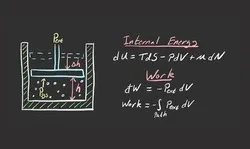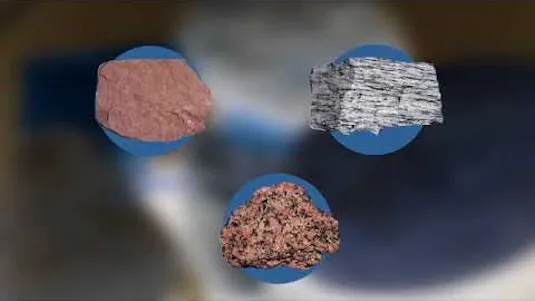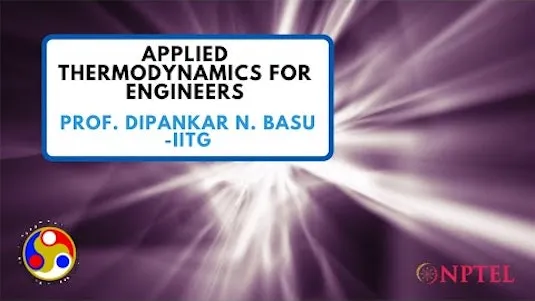
Chemical Thermodynamics I: Thermodynamics and Statistical Mechanics 
This course introduces students to the fundamentals of chemical thermodynamics and statistical mechanics. It covers topics such as thermodynamics, phase equilibria, and kinetics. Students will gain an understanding of the principles and applications of thermodynamics and statistical mechanics. ▼
ADVERTISEMENT
Course Feature
![]() Cost:
Cost:
Free
![]() Provider:
Provider:
Edx
![]() Certificate:
Certificate:
Paid Certification
![]() Language:
Language:
English
![]() Start Date:
Start Date:
Self paced
Course Overview
❗The content presented here is sourced directly from Edx platform. For comprehensive course details, including enrollment information, simply click on the 'Go to class' link on our website.
Updated in [February 21st, 2023]
This course is the first in a series of two thermodynamics courses that together, cover chemical thermodynamics, statistical mechanics, phase equilibria, and kinetics.
In this course, you will explore the foundational principles of thermodynamics for chemical systems and how these principles connect to the properties of the molecules that comprise them. You will explore the laws of thermodynamics and how they combine to establish the relationships between entropy, energy, work, and heat flow. You will then leverage these relationships to understand the nature of equilibrium and the forces that drive spontaneous transformations. You will then be introduced to the field of statistical mechanics, which formalizes the molecular scale origins of thermodynamic principles. Finally, you will leverage your understanding of thermodynamics and statistical mechanics to explore fundamental applications, including heat engines, calorimetry, and equilibrium in multi-component systems.
(Please note that we obtained the following content based on information that users may want to know, such as skills, applicable scenarios, future development, etc., combined with AI tools, and have been manually reviewed)
Chemical Thermodynamics I: Thermodynamics and Statistical Mechanics is an online course that provides learners with a comprehensive introduction to the foundational principles of thermodynamics and statistical mechanics. Learners will gain an understanding of the laws of thermodynamics and how they combine to establish the relationships between entropy, energy, work, and heat flow. They will also explore the molecular scale origins of thermodynamic principles and how to apply them to real-world problems, such as heat engines, calorimetry, and equilibrium in multi-component systems. This course is the first in a series of two thermodynamics courses and is ideal for those looking to gain a deeper understanding of the subject.
[Applications]
Upon completion of Chemical Thermodynamics I: Thermodynamics and Statistical Mechanics, students should be able to apply the principles of thermodynamics and statistical mechanics to a variety of chemical systems. They should be able to use the laws of thermodynamics to calculate the energy, entropy, and work associated with a system. They should also be able to use the principles of statistical mechanics to calculate the properties of a system at the molecular level. Additionally, they should be able to use their understanding of thermodynamics and statistical mechanics to analyze and predict the behavior of multi-component systems in equilibrium.
[Career Paths]
1. Chemical Engineer: Chemical engineers use their knowledge of thermodynamics and statistical mechanics to design and develop processes for the production of chemicals, fuels, and other materials. They also use their knowledge to optimize existing processes and develop new ones. Chemical engineers are in high demand in the energy, pharmaceutical, and food industries, and the demand for chemical engineers is expected to grow in the coming years.
2. Process Engineer: Process engineers use their knowledge of thermodynamics and statistical mechanics to design and develop processes for the production of chemicals, fuels, and other materials. They also use their knowledge to optimize existing processes and develop new ones. Process engineers are in high demand in the energy, pharmaceutical, and food industries, and the demand for process engineers is expected to grow in the coming years.
3. Research Scientist: Research scientists use their knowledge of thermodynamics and statistical mechanics to conduct research in the fields of chemistry, physics, and engineering. They use their knowledge to develop new theories and models, and to test and validate existing theories and models. Research scientists are in high demand in academia, industry, and government, and the demand for research scientists is expected to grow in the coming years.
4. Data Scientist: Data scientists use their knowledge of thermodynamics and statistical mechanics to analyze and interpret data from experiments and simulations. They use their knowledge to develop new algorithms and models, and to test and validate existing algorithms and models. Data scientists are in high demand in the tech industry, and the demand for data scientists is expected to grow in the coming years.
[Education Paths]
1. Bachelor of Science in Chemical Engineering: This degree program focuses on the application of chemical principles to the design, development, and operation of industrial processes. Students will learn about the fundamentals of thermodynamics, kinetics, and phase equilibria, as well as the principles of chemical engineering design and analysis. This degree is becoming increasingly important as the demand for sustainable and efficient energy production and utilization grows.
2. Master of Science in Chemical Engineering: This degree program builds on the fundamentals of chemical engineering and thermodynamics, and provides students with advanced knowledge in the areas of process design, process control, and process optimization. Students will also gain an understanding of the principles of statistical mechanics and their application to the design of chemical processes. This degree is becoming increasingly important as the demand for sustainable and efficient energy production and utilization grows.
3. Doctor of Philosophy in Chemical Engineering: This degree program focuses on the advanced study of chemical engineering and thermodynamics. Students will gain an in-depth understanding of the principles of thermodynamics, statistical mechanics, and phase equilibria, as well as the principles of chemical engineering design and analysis. This degree is becoming increasingly important as the demand for sustainable and efficient energy production and utilization grows.
4. Master of Science in Applied Thermodynamics: This degree program focuses on the application of thermodynamics to the design and operation of industrial processes. Students will gain an understanding of the fundamentals of thermodynamics, kinetics, and phase equilibria, as well as the principles of process design and optimization. This degree is becoming increasingly important as the demand for sustainable and efficient energy production and utilization grows.
Course Provider

Provider Edx's Stats at AZClass
Discussion and Reviews
0.0 (Based on 0 reviews)
Explore Similar Online Courses

Learn MongoDB in 2 hours

Neuroplasticity And CBT Complete Certification Course

Python for Informatics: Exploring Information

Social Network Analysis

Introduction to Systematic Review and Meta-Analysis

The Analytics Edge

DCO042 - Python For Informatics

Causal Diagrams: Draw Your Assumptions Before Your Conclusions

Whole genome sequencing of bacterial genomes - tools and applications

Viscous Fluid Flow

Metamorphic Petrology & Thermodynamics


Start your review of Chemical Thermodynamics I: Thermodynamics and Statistical Mechanics